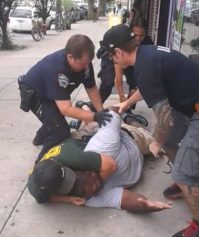Police body cameras were initially hailed as a savior that could solve the vexing problem of police brutality, but the protectors of the nation’s police departments are now making moves to make the cameras virtually useless.
A Missouri state legislator has introduced a bill to ban the public from having access to the body camera footage.
The idea is also supported by Missouri’s Democratic Attorney General Chris Koster, who released a report earlier this month that proposed closing the public’s access to the camera footage under the state’s Sunshine Law. He said the footage should be available only to people who are investigating a civil lawsuit about the incident or to others by court order.
“Adoption of this new technology must not lead to a new era of voyeurism and entertainment television at the expense of Missourians’ privacy,” the AG’s report said.
Of course, any issue connected to police in Missouri will receive national scrutiny after the explosive events in Ferguson last year following the death of Michael Brown at the hands of former Ferguson police officer Darren Wilson.
Republican state Sen. Doug Libla’s bill would not only prohibit the camera footage from a police officer body or dashboard camera to be exempt from the open records law, but it would also exempt all Missouri law enforcement agencies from being required to purchase the body cameras and all officers from being required to wear them.
During a hearing last week by the Senate Transportation, Infrastructure and Public Safety Committee, Sheldon Lineback, the executive director for Missouri Police Chiefs Association, pointed out all the times when police recordings wind up on Youtube.
“Individuals may make mistakes and those mistakes … never come off the Internet,” Lineback said last week.
It had become clear in any number of ways that body cameras were nobody’s panacea.
In addition to the case of Eric Garner, whose killing by NYPD was caught on video but led to no indictments, there have been other cases of law enforcement not being punished despite videotape evidence. Last year, two former Orange County, CA, police officers were acquitted of murder even after jurors watched the video of them beating a white schizophrenic homeless man to death.
Last week, published reports revealed that during a physical altercation between police officers and a suspect during a traffic stop, one of the officers was captured turning off the dash cam. The footage showed a group of police officers repeatedly using Tasers on a man they pulled over during a traffic stop. In the midst of the altercation, a female officer identified by Think Progress as Officer Kelli Swinton gives a grim warning to her colleagues.
“Hold up,”Swinton yells. “Hold up, y’all. Hold up. Hold up, everybody, hold up. We’re red right now, so if you guys are worried about cameras, just wait.”
A few seconds later, after Swinton walks over to the police car, the screen goes black.
FBI Director James Comey in his much acclaimed speech two weeks ago predicted that body cameras were not the answer to the policing problem. During his speech, Comey appealed to white America and to law enforcement to consider the role that their “unconscious racial biases” may play in their sometimes violent reactions to Black faces. He also said that though the nation has made great progress in the 150 years since Lincoln’s Gettysburg address, along the way a whole lot of people of color have been treated poorly by law enforcement.
“We must account for that inheritance,” Comey said. “And we—especially those of us who enjoy the privilege that comes with being the majority—must confront the biases that are inescapable parts of the human condition. We must speak the truth about our shortcomings as law enforcement, and fight to be better. But as a country, we must also speak the truth to ourselves. Law enforcement is not the root cause of problems in our hardest hit neighborhoods. Police officers—people of enormous courage and integrity, in the main—are in those neighborhoods, risking their lives, to protect folks from offenders who are the product of problems that will not be solved by body cameras.”

